Just as state’s nightspots were recovering from scrutiny after Pune Porsche crash, the Worli hit-and-run has brought fresh misery for pub owners. Hospitality veterans and state officials face it off in this week’s biggest social responsibility debate
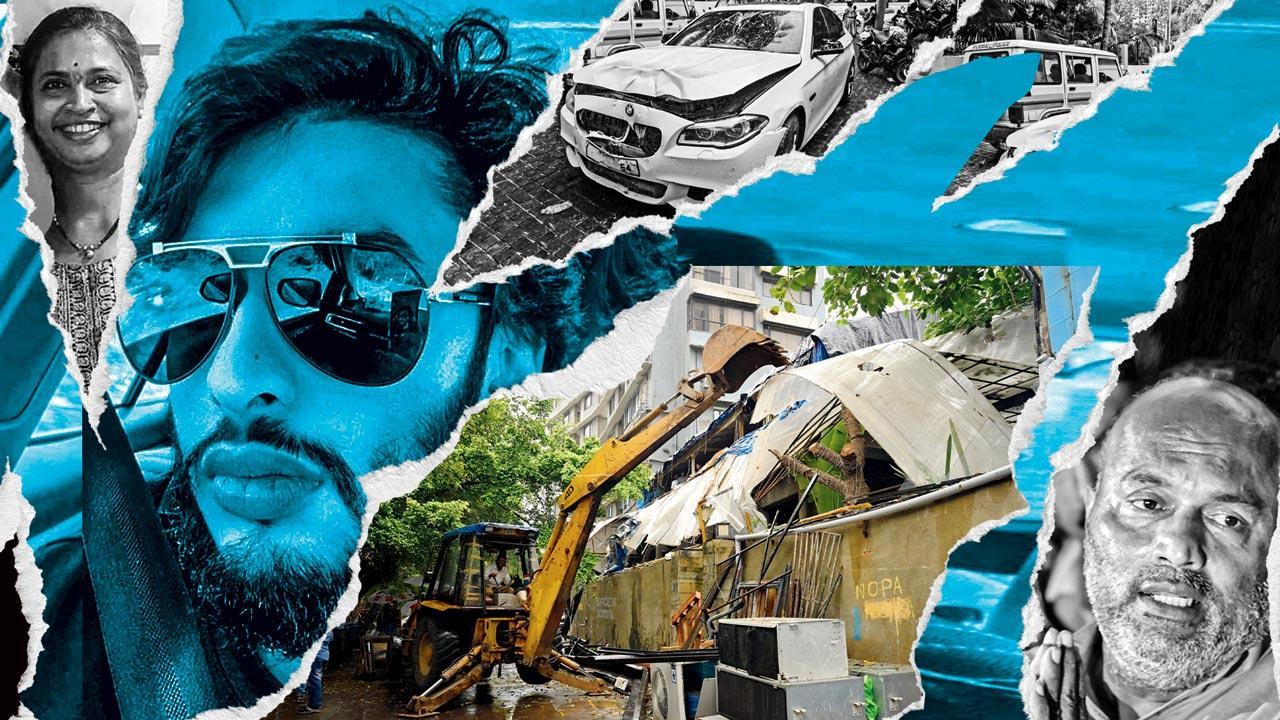
Photo collage/Uday Mohite
Let's face it, young people can’t be stopped from drinking. Sure, there are laws to prevent it, but barely any enforcement. Ask for their ID to prove their age, and they’ll show a fake one. Bars, too, are unlikely to push beyond this perfunctory exchange, especially when youngsters form a large chunk of their patronage.
But who is responsible when one of them goes behind the wheel and crashes?
In Maharashtra, the legal minimum age to drink beer and wine is 21; for hard liquor, the cap is raised to 25 years. But step into any bar in the city, and chances are you’ll see faces that don’t look a day over 20. Despite rules in place to check identity proof and block underage drinkers from entry, they find ways around it, including entering an establishment with older friends.
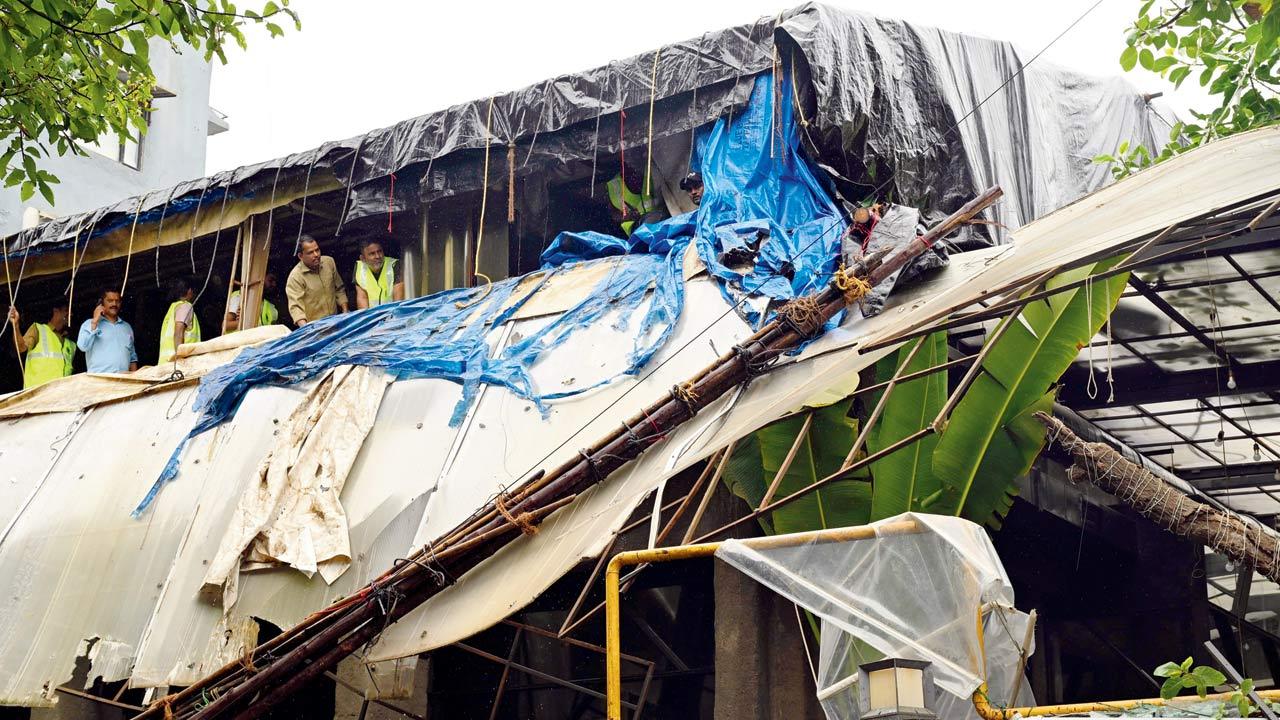 BMC partially razes Vice Global Tapas Bar in Juhu days after it was discovered the pub had served liquor to a 23-year-old who went on to drive under influence and mowed down a woman in Worli
BMC partially razes Vice Global Tapas Bar in Juhu days after it was discovered the pub had served liquor to a 23-year-old who went on to drive under influence and mowed down a woman in Worli
In last week’s Worli hit-and-run case, 23-year-old Mihir Shah resorted to this method at Juhu’s Vice Global Tapas Bar where, police say, he drank multiple pegs of whisky in the intervening night of July 6 and 7. He then left the pub with his friends and driver, bought four beer cans from Malad and consumed them in the car while driving towards south Mumbai, where he allegedly mowed down a 45-year-old fish monger who was returning from Crawford Market with her husband after buying the day’s catch in the wee hours. Shah’s BMW is said to have hit the two-wheeler from the rear, flinging the couple into the air. They landed on Shah’s bonnet, and Kaveri Nakhwa slipped under the car’s wheels. Shah was accused by her husband Pradeep of dragging her body for a distance of 1.5 km in a bid to escape.
Two days later, the state excise department sealed the Juhu pub for serving liquor to underage drinkers, among other reasons. A day after, on July 10, the BMC partially razed portions of the bar which it said were illegal extensions. Officials clarified that despite the timing, the demolition was not related to the Worli accident involving Kaveri.
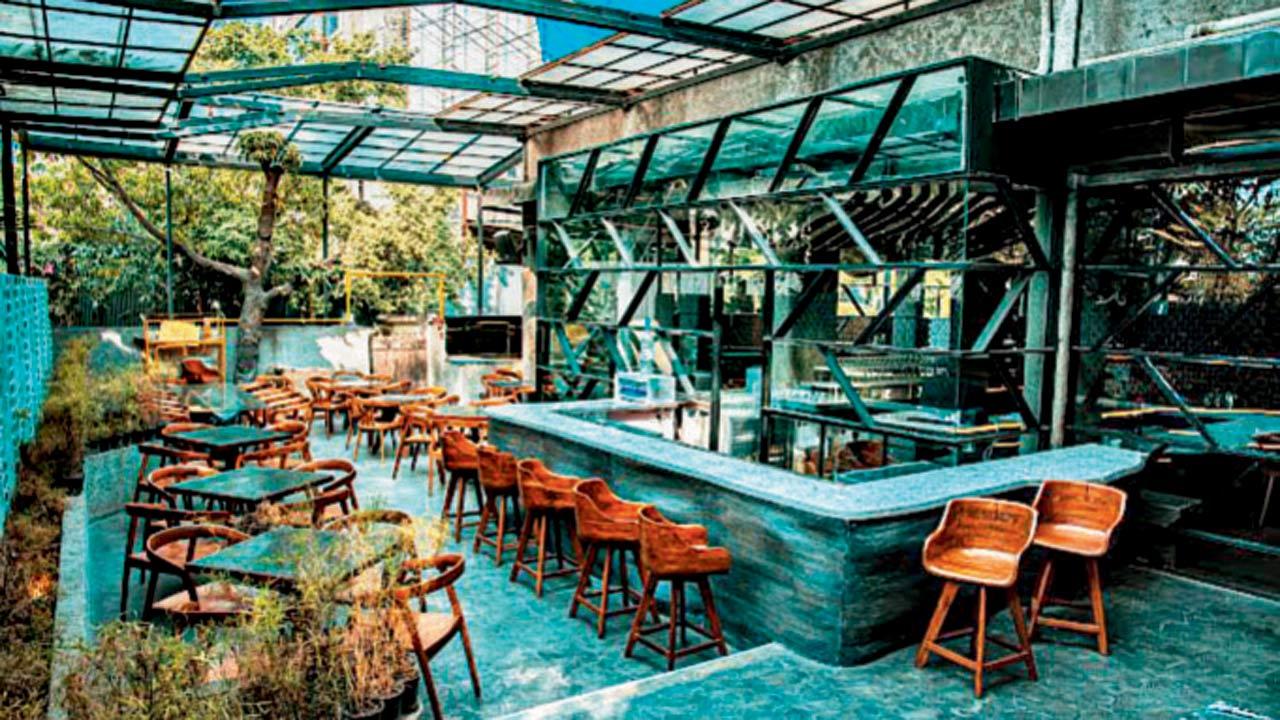 Vice Global Tapas Bar before the demolition action
Vice Global Tapas Bar before the demolition action
“It was found that an open space of about 1,500 sq ft on the ground floor and 2,000 sq ft on the roof were being used without permission by placing an iron shed. Accordingly, the encroachment removal team demolished the construction,” a civic official told mid-day.
Not everyone is convinced, though.
Restaurateurs across Mumbai that mid-day spoke to, amid the outrage over the crash, are lamenting how hospitality establishments are an easy target for the authorities; demolition action then is merely for optics, to declare that action has been taken. “If someone drinks at our restaurant, goes out and has an accident, how is it our fault?” asks a staffer at Vice after the demolition.
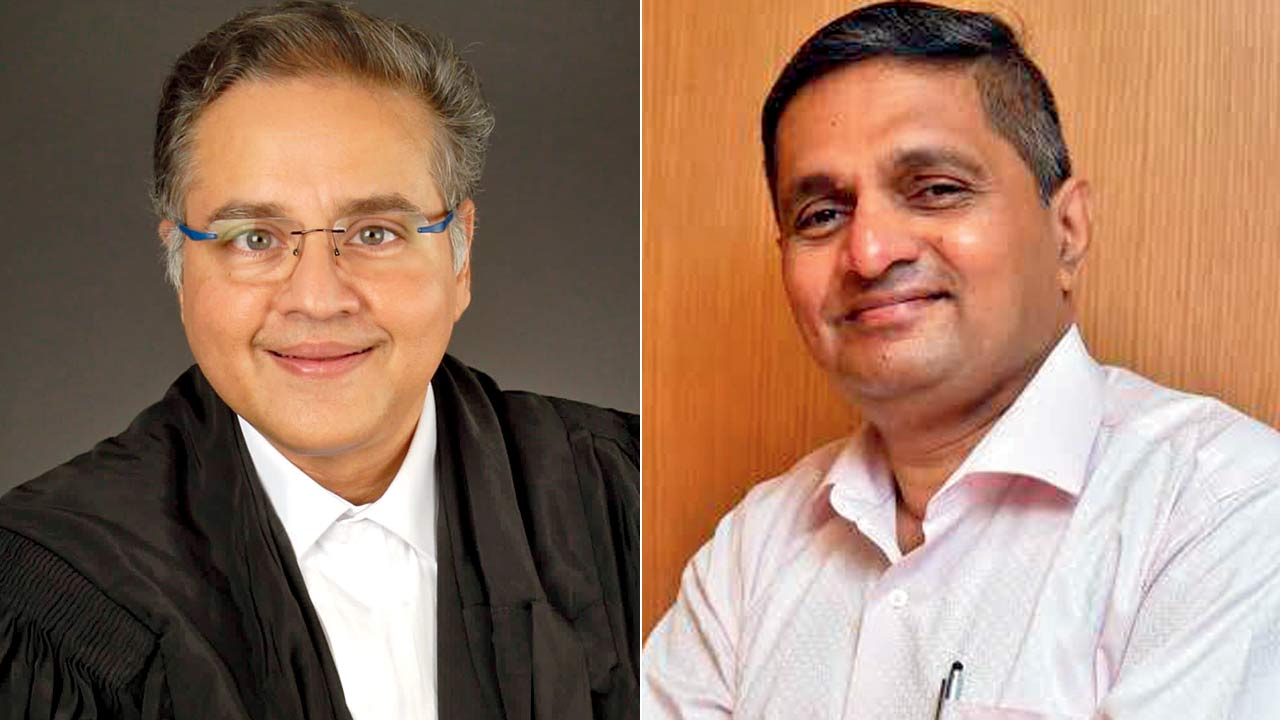 Advocate Sujay Kantawala and Dr Harish Shetty, psychiatrist
Advocate Sujay Kantawala and Dr Harish Shetty, psychiatrist
The most hospitality staff can do is ask to see a photo ID to determine the age of the patron. The Juhu pub’s management has claimed that the staff checked Shah’s older friend’s ID and allowed the group entry.
Pawan Shahri is co-founder of Chrome Hospitality that runs popular pubs Lyla, Blah! and Gigi. He argues that counting a restaurateur to be party to a drink and drive case is baseless. “A person driving under the influence is responsible since s/he has taken to the wheel. Where they drank is not the question. Our job is to check their ID and serve an order. A general store owner who sold a knife cannot be responsible for a murder carried out with the purchase.”
Shahri questions the demolition of structures as a reaction to a drink driving case. “The BMC knows best what is legal and not; but it [demolition of illegal extensions/encroachments] should be done for the right reason,” he says.
 Mihir Shah was allegedly driving a BMW (far right) under influence when it hit Kaveri and Pradeep Nakhwa’s two-wheeler
Mihir Shah was allegedly driving a BMW (far right) under influence when it hit Kaveri and Pradeep Nakhwa’s two-wheeler
Veteran restaurateur Gauri Devidayal, who runs The Table in Colaba and Mag St Cafe outposts across South Mumbai and Bandra, points to a news report that states that Shah had left the Juhu bar at 1.30 am, gone home and stepped out to get more. The accident occurred four hours later. “The bar should not be responsible for the action of a customer after s/he leaves the premises,” she states.
It’s not uncommon, she says, for her restaurant’s valet staff to drop off a guest home if they aren’t in a condition to drive; or they call them a cab. “As long as
we don’t serve alcohol to an underage patron… that’s where a restaurant’s responsibility should end. Placing more naka bandis across the city will certainly be a deterrent. People should be afraid enough of the penal consequences of drinking and driving.”
Sealing hospitality establishments, she feels, serves no one. “So many people lose jobs; closing bars also cuts down excise revenue. A more mature, long-term solution is the need of the hour,” she thinks.
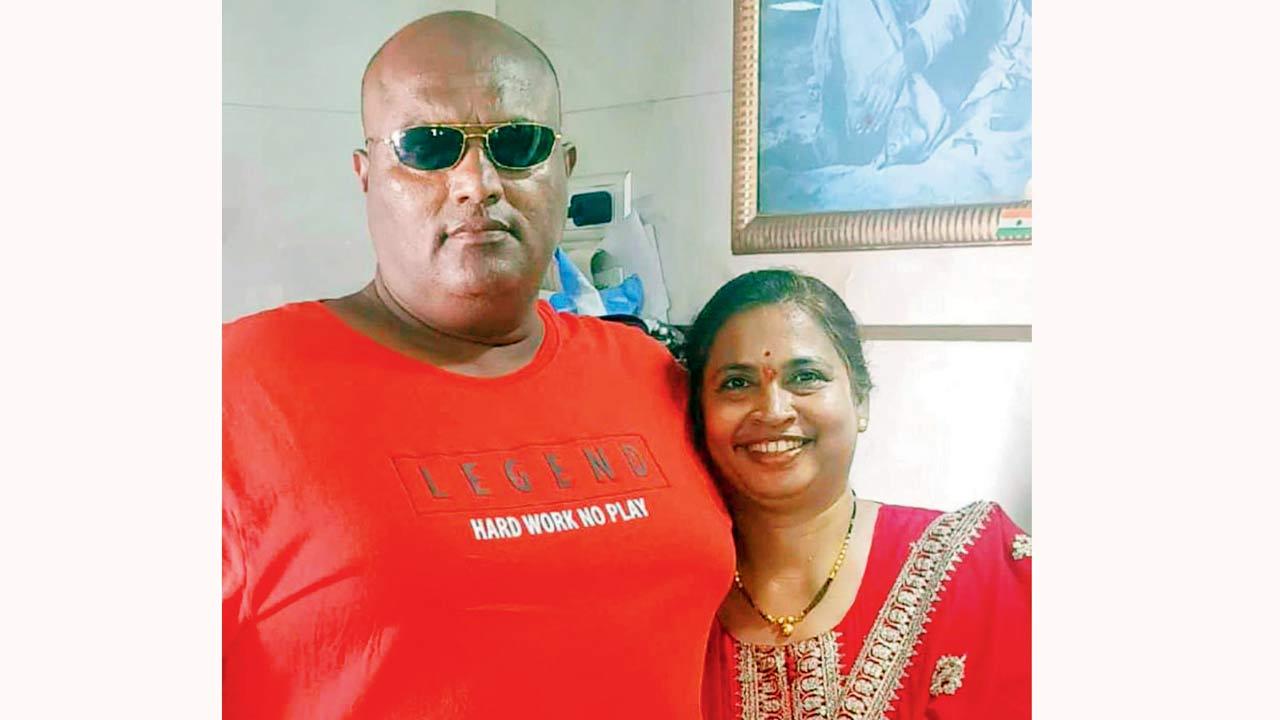 Kaveri and her husband Pradeep. She had landed on the BMW’s bonnet and slipped under the car’s wheels
Kaveri and her husband Pradeep. She had landed on the BMW’s bonnet and slipped under the car’s wheels
The pressure on the hospitality industry has been mounting since May 19, when a drunk 17-year-old in Pune driving a Porsche knocked down two motorbike-borne engineers on May 19. The two bars that had served him alcohol were promptly razed, and a widespread crackdown ensued across Pune and Mumbai.
Following the Porsche crash, at least 33 pubs were razed in Pune. In Mumbai, police raided more than 50 bars; at least 12 such establishments were demolished
in MMR, while notices were served to 40.
This is not the first time that demolition action has been taken and notices been served to eateries and bars. In 2017, after a deadly fire at a pub in Kamala Mills, municipal officers went on a demolition spree, razing portions of 314 restaurants and bars across the city for violations.
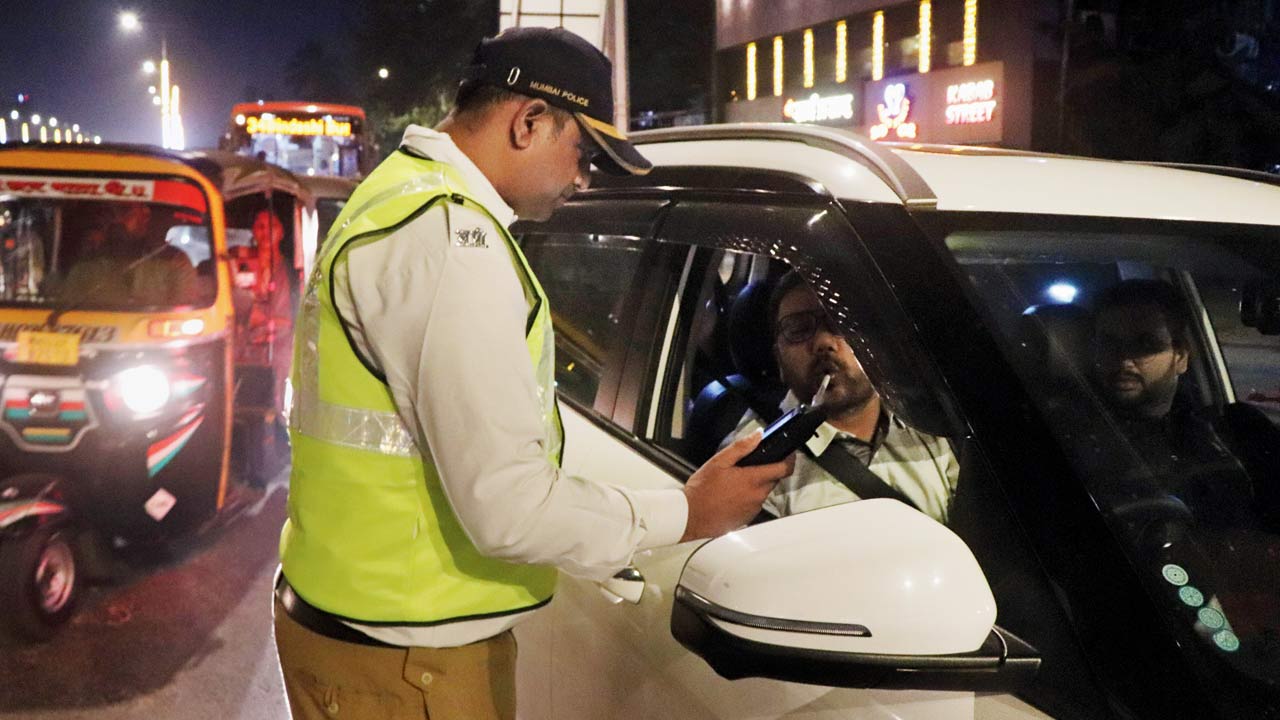 Police heighten their drives against drink driving during festive seasons and weekends, looking for inebriated motorists with the help of breathalysers. Representation pic
Police heighten their drives against drink driving during festive seasons and weekends, looking for inebriated motorists with the help of breathalysers. Representation pic
Pulling up a restaurant or bar for serving alcohol to those who get involved in a drink driving case is absurd, says another restaurateur on condition of anonymity. The excise department is serving notices for various issues including maintenance of the FLC [foreign liquor certificate] book [detailing] how much alcohol has been purchased and sold, which has to be in filled every week. He says, “The responsibility cannot be on the person who is serving the alcohol, it’s on the person who’s drinking. If we had the right to deny, we would do our part [but we don’t]. That is something that we would like the government to enforce.”
In the US, UK and some other countries, this protection is provided in the form of the dram shop law. It is a civil liability statute that makes bars liable for the harmful acts of its drunk patrons—including drink driving and brawls—when the establishment has acted negligently in serving an already intoxicated customer more alcohol. While this puts the onus on the pub, it also empowers them to say no to the patron.
But is it the bar’s job to say “no more” to an intoxicated customer? Would such a law even work in India, where binge drinking has been flagged as a problem afflicting nearly half the country’s drinkers, according to a government study in 2019, titled Magnitude of Substance abuse in India. The study states that 43 per cent of alcohol users consume more than four drinks in a single sitting, indicating heavy episodic drinking.
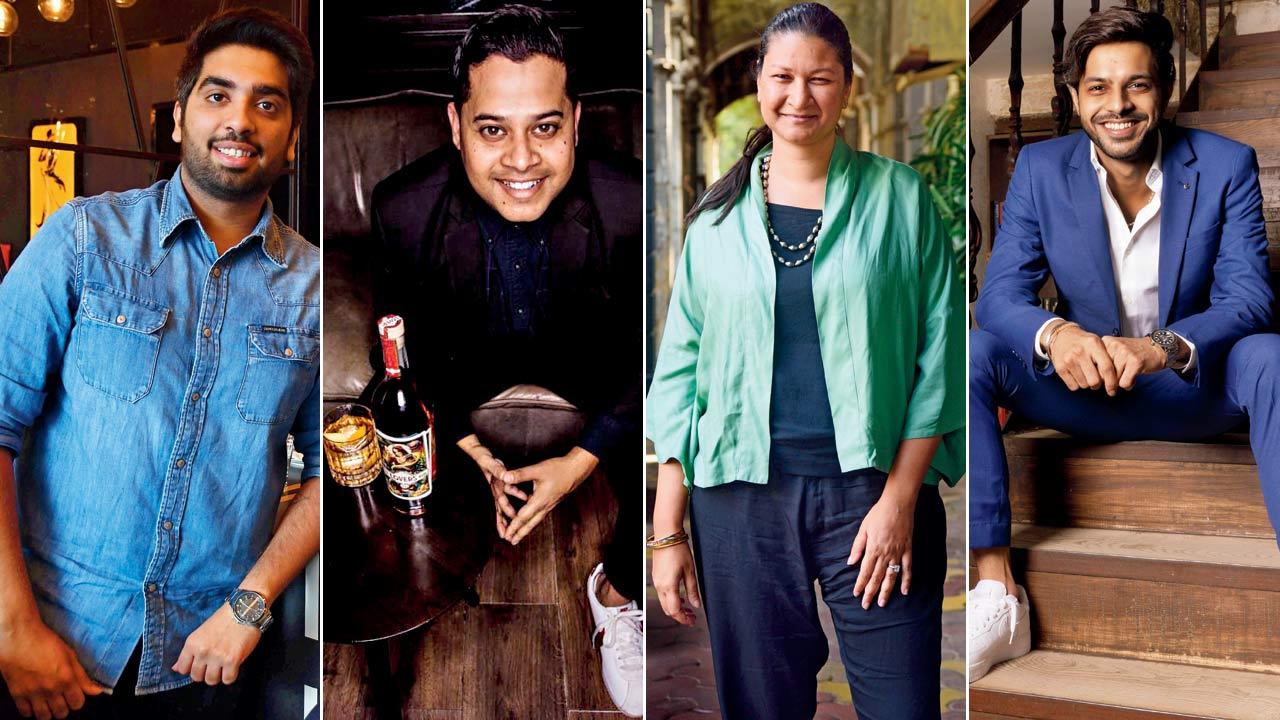 Pawan Shahri of Chrome Hospitality says he supports installing AI-based CCTV cameras if it gives bars immunity; Bar owner Arijit Bose hopes India introduces training for safe service of alcohol; Restaurateur Gauri Devidayal feels more naka bandis in the city may be a better solution; AI CCTV may help tackle the problem of fake IDs, says Karan Nohria, founder of Oh So Silly
Pawan Shahri of Chrome Hospitality says he supports installing AI-based CCTV cameras if it gives bars immunity; Bar owner Arijit Bose hopes India introduces training for safe service of alcohol; Restaurateur Gauri Devidayal feels more naka bandis in the city may be a better solution; AI CCTV may help tackle the problem of fake IDs, says Karan Nohria, founder of Oh So Silly
The same study also highlighted that many drinkers experienced problematic behaviours upon intoxication, such as drunken brawls (26.8 per cent drinkers) and road accidents (4 per cent).
Worryingly, a recent World Health Organisation (WHO) report notes a tendency of binge drinking among Indian teenagers between 15 and 19 years, with a 7.1 per cent occurrence among male teens and 5.2 per cent among females.
“Bartenders [abroad] undergo training to detect whether a person has had a certain number of drinks and what their blood alcohol level should be. On that basis, they serve or deny him/her the next drink. This does not happen in India. Here, if a person is drunk, and you don’t hand him over the keys of their car, they can file a police complaint,” says the restaurateur.
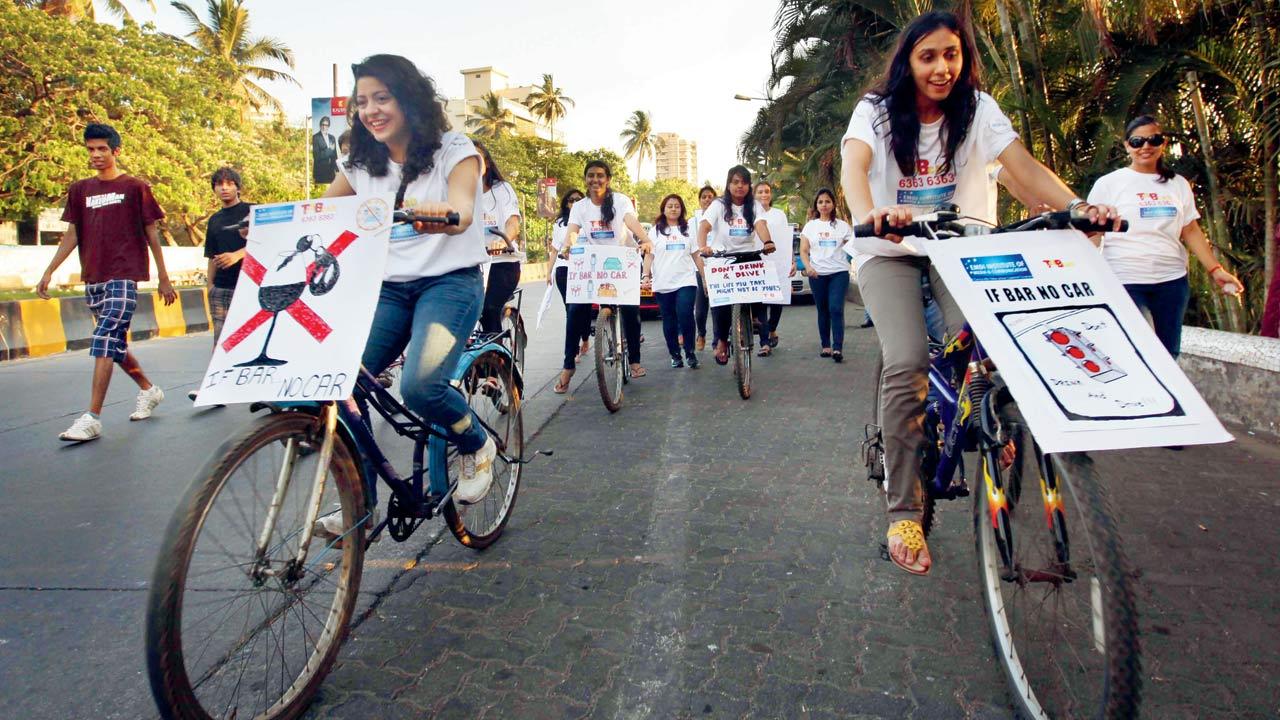 A group of young Mumbaikars on a cycle march against drinking and driving at Carter Road in Bandra in 2013, carry posters that read If Bar, No Car. File pic/Getty Images
A group of young Mumbaikars on a cycle march against drinking and driving at Carter Road in Bandra in 2013, carry posters that read If Bar, No Car. File pic/Getty Images
Senior bar consultant and entrepreneur Arijit Bose has undergone safety service for alcohol training. “Abroad, bartenders as well as service personnel, go through safety service for alcohol training, along with [acquiring] health and hygiene certifications. This should be introduced in India too. I went to Australia for a two-day bartending stint I had to acquire a full certification for safe service of alcohol. It’s the same in Canada.”
In 1999, turning away an intoxicated patron proved fatal for model Jessica Lal. Manu Sharma, son of a Haryana politician, had shot Lal—a celebrity bar maid at a private party in Delhi—after she refused to serve him a drink as the bar had closed.
Well-trained bartenders are still rare in India and often expensive to hire, says Bose. “Owners hire mixology and bar talent but not all of them are equipped to handle entitled guests. Even managers face this. Often, guests name-drop or threaten to give a bad review. Despite this, bars and bar operating teams do keep an eye out and cut people off when possible or book them a driver or a cab. But it is difficult to keep an eye out when the bar is packed. A lot of times, consumers leave the bar seeming okay but the alcohol hits them later,” Bose explains, suggesting that a collective effort is required towards guiding and training staff as well as consumers on responsible drinking.
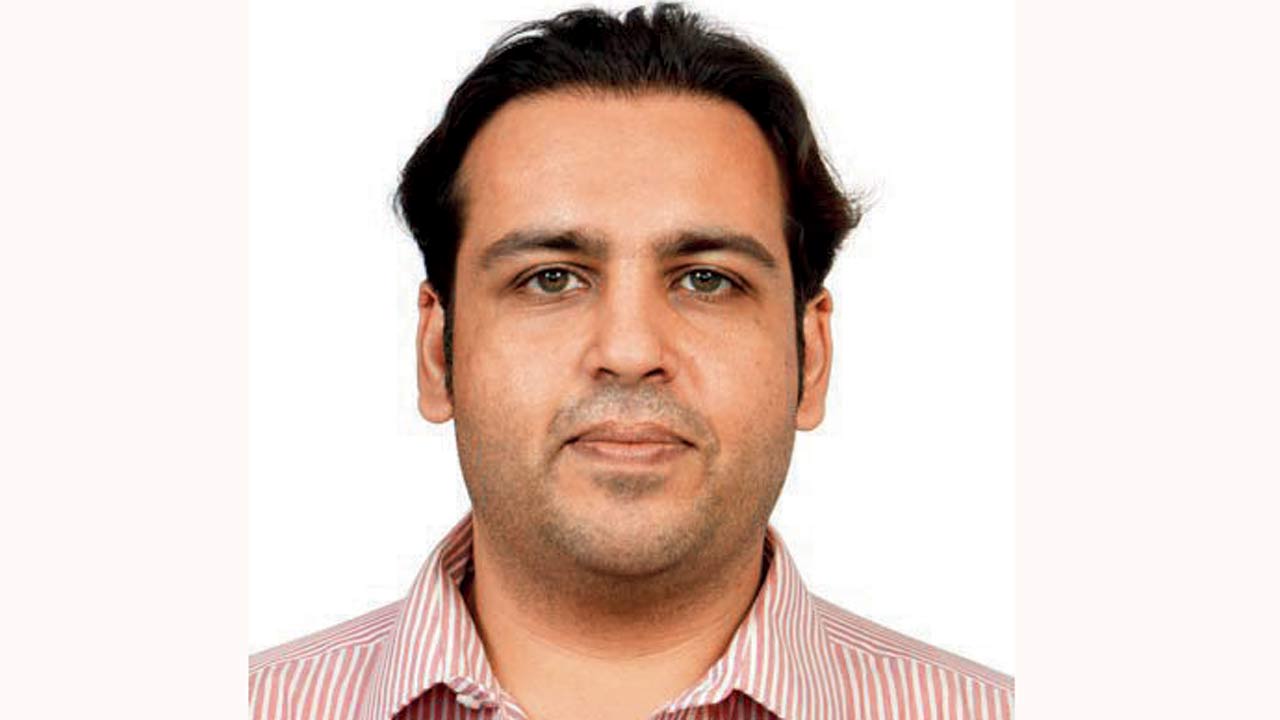 Pranav Rungta, vice president, NRAI
Pranav Rungta, vice president, NRAI
“Bars and restaurants go to great lengths to safeguard guests and create a convivial environment so that people keep coming back and patronise the venue, but one person’s carelessness can cause a ripple effect. A shut down affects revenues and salaries. Education at all levels is the key,” Bose says.
However, most members of the hospitality industry we spoke to were against the introduction of a dram shop law, saying it would only make it tougher for them to run their business. “Today, more than ever, it has become hard to run a bar,” confesses a prominent restaurateur, adding, “We already have a zillion regulations and licences to keep up with. Now, with the recent drinking and driving cases, people are scared. The ease of doing business has vanished.”
Pranav Rungta, vice president of the National Restaurant Association of India, speaks for the industry as a whole when he says that the organisation is against excessive regulation. “The responsibility of policing is with the government, not the private industry. Excise laws in the state are archaic and draconian and need an overhaul first,” he says.
Advocate Sujay Kantawala, who specialises in criminal and indirect tax cases at the Bombay High Court, says that such a law would never work in India. “How would you even go about enforcing such a law here? Even basic things like checking IDs for age proof is not being done. It’s hard running a restaurant or bar in Mumbai. They cannot afford to lose business, but that is what will happen if you bring in a law that says that after a customer has had X number of drinks, a bar has to stop serving alcohol to them. Customers will simply go to another bar and order more drinks there. Bringing in a law like this will just be another reason for restaurants and bars to grease palms in order to keep trouble at bay,” says the legal expert.
Mumbai Police say they regularly conduct surprise checks at pubs and restaurants to ensure compliance with the age criteria under the Maharashtra Prohibition Act, 1949, and Bombay Foreign Liquor Rules, 1953. “Whenever we find violations of permit requirements or the age cap, we forward the bar’s details to the district collector, who is authorised to take action,” says an officer.
A beverage and spirits expert, on condition of anonymity, argues that the law would not work in India anyway since we have a different sense of service. “We follow the ‘customer is king’ approach. I can’t imagine a 25-year-old behind the bar denying a drink to a 40-year-old. Denying a drink is not necessarily an age thing; a bartender’s socioeconomic status will make him hesitate. You don’t know how patrons will react. We need a stricter drink and drive policy and vigilant naka bandis. People should be petrified of driving under the influence of alcohol knowing that they will be caught.”
The Traffic Police also conduct naka bandi and special drives using breath analysers to curb drink driving. These drives are ramped up around weekends and festivals, when incidents of drink driving go up as well. Additional CP (Traffic police) M Ramkumar says, “20 FIRs have been registered in cases related to drink driving this year, as of June 20, and 3,773 offenders were fined a total of Rs 1.7 crore for driving under the influence of alcohol.”
“If we find that the offender is under 21, we also take down details of the concerned bars and pass them on to the local police, who take further action as per the law,” says another traffic cop.
Restaurateurs argue that with pressure and accountability should come protection. “About three weeks ago, the Excise department released a notification to the effect that if a patron drinks in your restaurant, and goes out and commits an act of crime, the bar owner will be liable.
How the patron behaves after s/he has left the premises is not our responsibility. It’s the job of the state to maintain law and order,” says a restaurateur.
A state excise department official, however, clarifies to mid-day that no new notification has been issued to hoteliers and pub owners threatening action. The notification the being referred to specifically, he clarifies, concerns serving alcohol to minors. “Notifications and reminders are sent periodically, informing hoteliers of the laws and the consequences of breaches. For instance, if someone allows an underage patron to drink hard liquor and that minor commits a crime, we are authorised to take action as per the law. This is standard procedure.”
The official explains that they are liable to take action if during routine weekly surprise checks at hospitality establishments, they find minors drinking there. “If a crime is committed, strict action will be taken. Bar and pub owners need not worry as long as they follow the rule book,” says a senior officer of the excise department.
According to the official, the department has granted permits to 1,513 bars and pubs in Mumbai, and they keep inspecting these to ensure there are no violations. It is mandatory for the department to conduct surprise checks at bars and pubs three times a week, especially on weekends when footfall is higher, he says. They could also carry out surprise checks based on specific information they may receive in the middle of the week. Officials emphasise that the rule is clear: liquor can only be served to individuals of age who possess a liquor permit.
They also clarify to mid-day that there are no rules to take action against a person who is of legal age and consumes alcohol. However, the law allows for action against bars and pubs that violate said regulations. “In cases where the age criteria are not followed by establishments, we discover during a surprise check that liquor is served without a permit during. We record the facts and submit
a file to the collector. The collector is authorised to take action, including imposing a fine of up to Rs 50,000. In some cases, where a crime has been committed by a person after consuming liquor at the premises, the collector can temporarily seal the place or revoke the pub’s liquor licence,” says an officer of the excise department.
Showing laxity while following rules by establishments in a bid to not lose business is where the problem rests, according to him. “The managers of pubs with permits are instructed to maintain records of every patron, but they often fail to comply. In this particular case, the pub staff only checked the ID of the person who booked the table where Mihir Shah was seated, allowing the rest of the group entry without proper verification. If a patron uses a fake ID to drink and subsequently commits a crime, they can be charged with forgery by relevant authorities. But for this, pubs must maintain adequate records,” says the official.
Mumbai-based practising psychiatrist Dr Harish Shetty says the problem is unethical parenting—allowing the child freedom and entitlement that could prove dangerous for someone else, and then even offering to cover it up. “Is there a single bar in the city where you don’t see someone under 25 drink? Obviously, the authorities know; they act when they will.”
Shetty also questions the logic behind separate age caps for beer and wine, and hard liquor. “Beer and wine have lower alcohol content, but no one drinks either in pegs. People drink beer and wine by the bottle or glass. If you drink a bottle of wine or three cans of beer, you will be just as drunk as someone having downed a couple of pegs of whisky,” he says.
“In an ideal world, the police would be waiting outside bars with their breathalysers, and would check drivers for blood alcohol content as soon as the car’s ignition is switched on. But the police are already spread thin and overworked,” he says.
Meanwhile, the state government says it is pressing on with the installation of AI-based CCTV cameras in pubs and bars in a bid to curb drink driving cases. The excise department had set a 14-day deadline for the task last month, after the Porsche hit-and-run case in Pune. But restaurateurs say they are yet to receive any official notification on the matter.
“I read about this, but we have not received an official directive yet. Restaurants are a public place, so if it helps maintain law and order, this is doable. It really depends on the execution. If it is done without damaging current assets, helps the cops get footage and the restaurant can get immunity in a case like this, then might as well support them on this” says Chrome Hospitality’s Shahri.
Others remain sceptical. “We are checking whether the government is indeed enforcing this mandate, as there are many complexities involved in execution. However, I am sceptical about where the data will be shared, and whether it may infringe on customers’ privacy. I believe that while sharing CCTV footage of entrance and exit areas may be acceptable, monitoring day-to-day operations could compromise privacy. If carried out well, this measure helps both restaurants and the government address issues such as fake IDs, especially since we currently lack a system to scan Aadhaar cards for legitimacy,” says Karan Nohria, founder, Oh So Silly.
The AI-based CCTV surveillance programme is in a preliminary stage, explains an excise official. “Currently, we are evaluating demos provided by service providers. These systems will be installed at a few locations on a trial basis. Once successful, we will issue a tender, and contracts can be awarded to service providers. Hotels, bars, and pubs can then purchase these services from them,” says the officer.
“Once the basic AI surveillance is successful, we will consider implementing facial recognition cameras at entrances. These cameras can help identify if a person is under 21 based, and the information can be verified by the concerned officer during visits. However, this is currently under discussion with high-ranking officials in Maharashtra,” the officer tells mid-day.
The department already receives livestreams from several bars, but it is not possible to manually monitor the thousands of feeds, he says. “AI surveillance will provide notifications if a bar or pub is open beyond permitted time limits. The cameras will focus on the bar counter and entrance, so there is no question of invading anyone’s privacy,” he assures.
7.1
Percentage of male teens in India that have a tendency for binge-drinking, as per WHO
1,513
No. of bars in Mumbai that currently have excise dept permits
Get your permit
In Maharashtra, pubs and bars can issue alcohol permits to patrons. These are also available online on the Maharashtra Government Excise Department website (https://aaplesarkar.mahaonline.gov.in/en). Alternatively, permits can be procured from the Old Custom House in South Mumbai. A one-day licence costs Rs 5 for foreign liquor and Rs 2 for country liquor. An annual permit costs Rs 100, and a lifetime permit is available for Rs 1,000.
Inputs by Debjani Paul and Apoorva Agashe
 Subscribe today by clicking the link and stay updated with the latest news!" Click here!
Subscribe today by clicking the link and stay updated with the latest news!" Click here!










